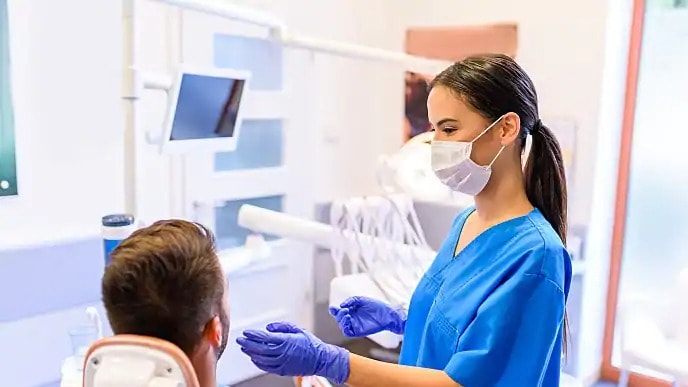What Is the Soft Palate?
Touch your tongue to the roof of your mouth. Do you feel the hard and bumpy part of your palate right behind your front teeth? In this area, the bone of your skull is immediately under the soft covering of tissue. As you move your tongue to the back of the roof of your mouth, the tissue starts to get more bouncy, soft and smooth. It is at that point where your hard palate meets your soft palate.
The soft palate extends from the end of the hard palate all the way to the back of your throat, ending at the little hanging teardrop of tissue called the uvula. The soft palate's main function is to rise up and close off your nose and throat when you swallow to keep food out of your lungs and nasal passages, writes Britannica. It is at this area where the oral cavity ends, and the oropharynx (throat) begins. At this small, muscular junction, your body branches off into the lungs and the stomach.
Swollen Soft Palate Symptoms
Since the soft palate contains a few different types of body tissues such as blood vessels, muscles, ligaments and fat, it is common for this area to exhibit signs of swelling and inflammation when the body experiences a viral, bacterial or fungal invasion. And since this area is connected to both the respiratory and gastrointestinal systems, it is important to evaluate any symptoms to determine the cause of the swelling. This inflammation is the body's sign that there is an invader, and it needs help!
Unfortunately, that invader could also be oral cancer, according to the American Dental Association (ADA). The early oral signs of this disease include swelling, lumps, redness, pain and loss of function. Your dental provider is the ideal medical professional to address cancer concerns. You can request a regular screening every time you get your teeth cleaned.
Swelling on the roof of your mouth could also be from something as simple as a canker sore or a burn from hot coffee. Doctors Health Press notes that a swollen feeling can come from dehydration, especially after overconsuming alcohol the night before. Drinking plenty of water and keeping up your electrolytes with fruit juices and energy drinks won't hurt if your swollen palate also comes from a virus, but you should visit your dentist if symptoms last for more than a day.
Treatment
After a thorough assessment, your dental provider may recommend a referral to another member of the health care team. Sometimes, the treatment will be as easy as visiting the store to pick up some mouthwash to cleanse and soothe minor mouth irritations. Other times, a biopsy or other testing may be necessary. It's important to remember that early detection is key, and swelling in the palate should be addressed immediately so you don't experience difficulty breathing should the inflammation and swelling get worse.
Your dental professional is your partner in the prevention and treatment of disease. Routine oral care is the key to total body wellness, and that means more than just your teeth!
Oral Care Center articles are reviewed by an oral health medical professional. This information is for educational purposes only. This content is not intended to be a substitute for professional medical advice, diagnosis or treatment. Always seek the advice of your dentist, physician or other qualified healthcare provider.
ORAL HEALTH QUIZ
What's behind your smile?
Take our Oral Health assessment to get the most from your oral care routine
ORAL HEALTH QUIZ
What's behind your smile?
Take our Oral Health assessment to get the most from your oral care routine















